Ambassadors
40th Annual Schreiber Gala: One for the record books
March 20, 2024Our 40th Annual Gala was more than just a night to remember, it was also one for the record books.
Thanks to the generosity of our sponsors, auction donors, attendees, and remote silent auction bidders we were able to raise an incredible $300,709 to support the uncompensated care costs for our Schreiber Kids.

For the last 40 years our annual Gala has helped support our growing center. Through the addition of our childcare program and reverse mainstream preschool, our mental and behavioral health therapy services, and our growing recreational program offerings, our gala has been a backbone of financial support. Every year we ask more of our sponsors, donors, and attendees, and every year you come through for us and help us get closer to our goal! It is because of your generosity and commitment to our mission that we are still, 88 years later, able to keep Edna’s promise to never turn a child away from care, regardless of their family’s financial circumstances.
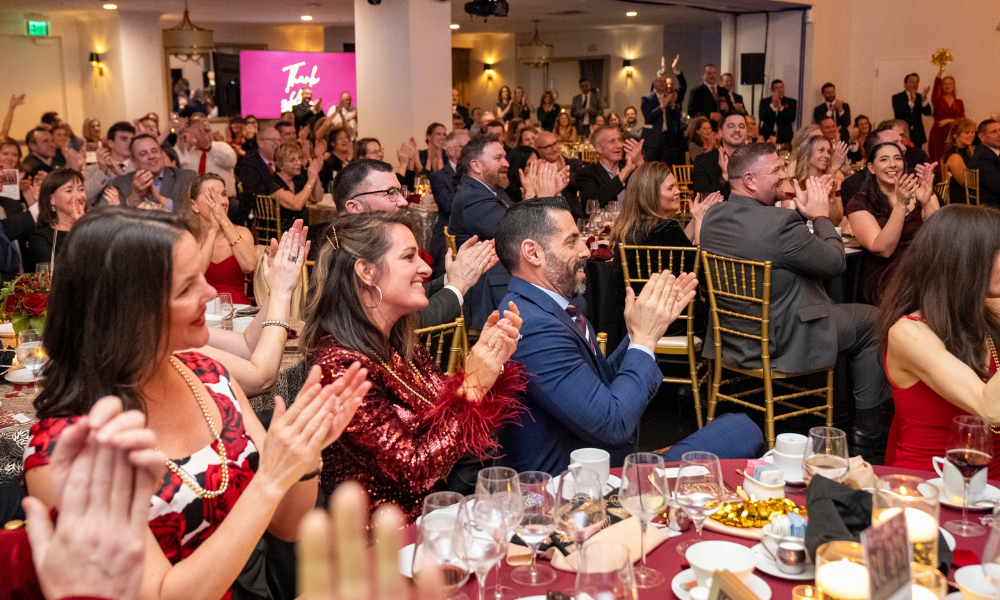
Our silent and live auctions alone raised an impressive $69,367! We are humbled by all the members of our community and local businesses who donated items. Even our staff got in on the fun, with our educational department and each therapy department donating individual baskets made with the help of their Schreiber kids. The success of these auctions is especially exciting because it means that we can provide services to more central PA kids in need.
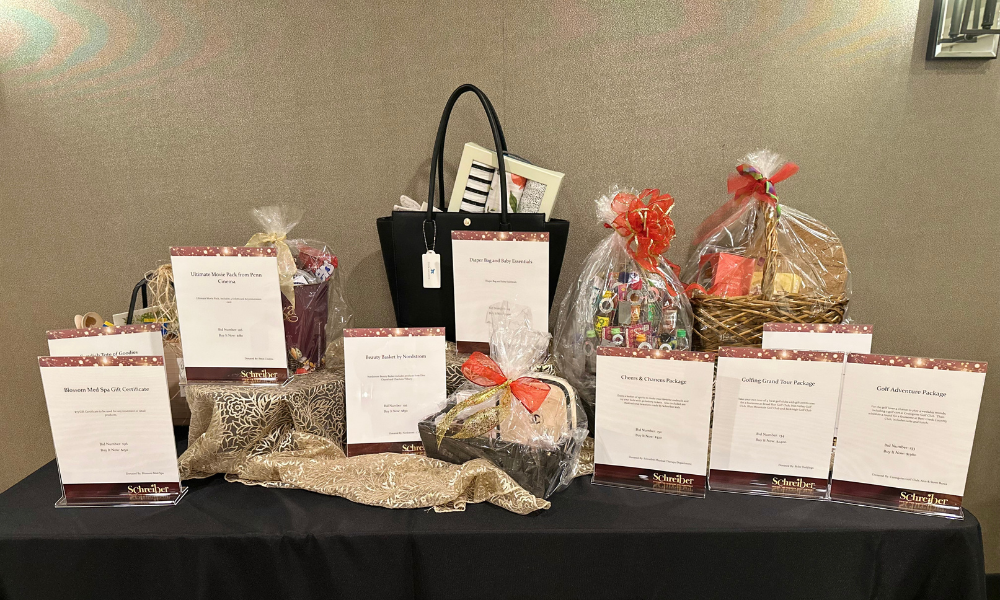
Kids like our 2024 Ambassadors Aubrey, Allegra, Colton, and Grayson. Kids and families who have graciously agreed to share their stories and journeys to highlight the progress being made here every day. Introducing and celebrating our ambassadors at our annual gala is a tradition that we cherish, as it allows attendees to meet and mingle with these families and witness firsthand the benefits of Schreiber through them. If you weren’t able to make it to our gala and you’re interested in learning more about this year’s ambassadors check out the 2024 Ambassador Introduction Video.
While each of our 2024 ambassadors have been attending therapies at the Schreiber center for a few years, we will be highlighting their progress and achievements on our social media channels this year to allow our friends and supporters to witness firsthand what makes our pediatric therapy center so special. So, make sure to follow us on Facebook and Instagram to watch their stories unfold.
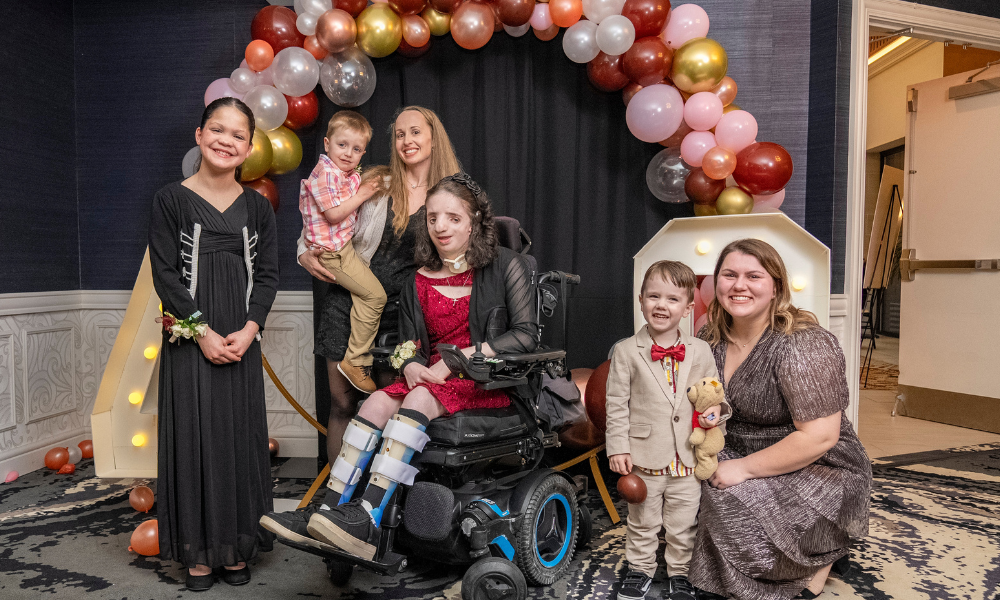
This year’s event would not have been the success that it was without the hard work and dedication of Shumaker PDT who made sure our event space was set up to both look and function beautifully. Their electronic expertise was especially appreciated this year as we had so much interest in the Gala that we ended up renting a second room so that we could open ticket sales up after we sold out and allow everyone who wanted to come out and support us to do so!
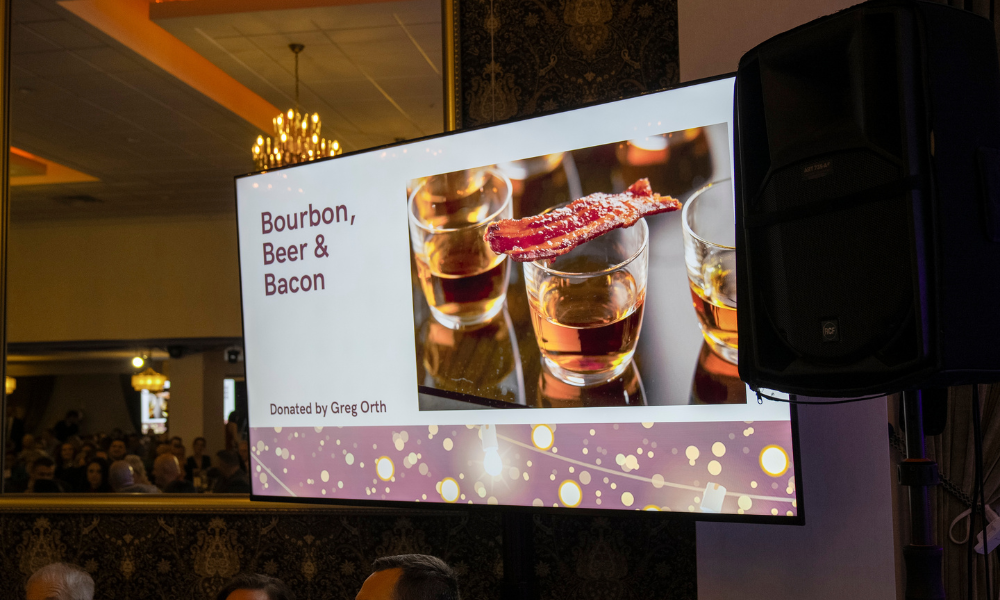
We also owe our incredible volunteers a special show of gratitude. They truly went above and beyond to make sure that our guests experienced the royal treatment, and the evening ran smoothly. From helping set up, run our registration booth, managing our silent auction, greeting our guests, handling coat check, and helping tear down the night, they planned an instrumental role in making our Gala a memorable and enjoyable evening for everyone in attendance. We are honored by their commitment and grateful for their time and care.
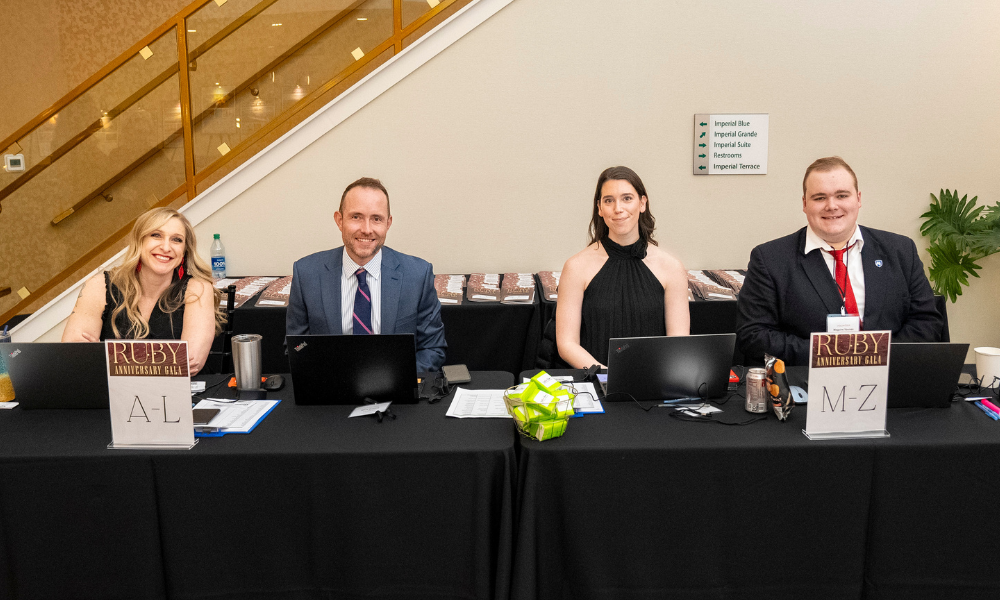
As terrific as this year’s gala was, it would not have been possible if not for our incredible sponsors. Their financial support both in funds bestowed and time and resources donated in-kind made the night possible. Our gratitude for the care and support of local businesses and organizations who continue to join forces with us to help our most precious population reach their fullest potential through therapy and educational services at Schreiber cannot be overstated. Thank you sponsors!

Help Schreiber Kids like our Ambassadors receive the care they need, by donating in support of our Kids’ Care Fund, a long and short term savings account used to cover the costs of uncompensated care.
As a nationally recognized pediatric facility, the Schreiber Center for Pediatric Development provides family-centered education and therapy programs for infants, children and adolescents with disabilities, developmental delays, and acquired injuries. Our goal-oriented approach maximizes each child’s ability to function independently within the community.
General Monthly eNewsletter Sign Up
Sign up to receive monthly newsletters to your email box to learn more about what is going on at the Schreiber Center, and how you can help support our mission to help every child in need reach their fullest potential.
Gala Photos by: Nick Gould Photography
Ambassador Video by: GP Film & Photography
2024 Schreiber Ambassadors Announced at the 40th Annual Schreiber Gala!
March 18, 2024Every year we choose a few lucky kiddos to be Ambassadors of our mission. To join us as special guests at our events. To share their stories with our families and friends. To highlight the life-changing services our therapists are providing every day to those who need them most. This year we’re proud to announce that we have four amazing kiddos serving as Schreiber Ambassadors.
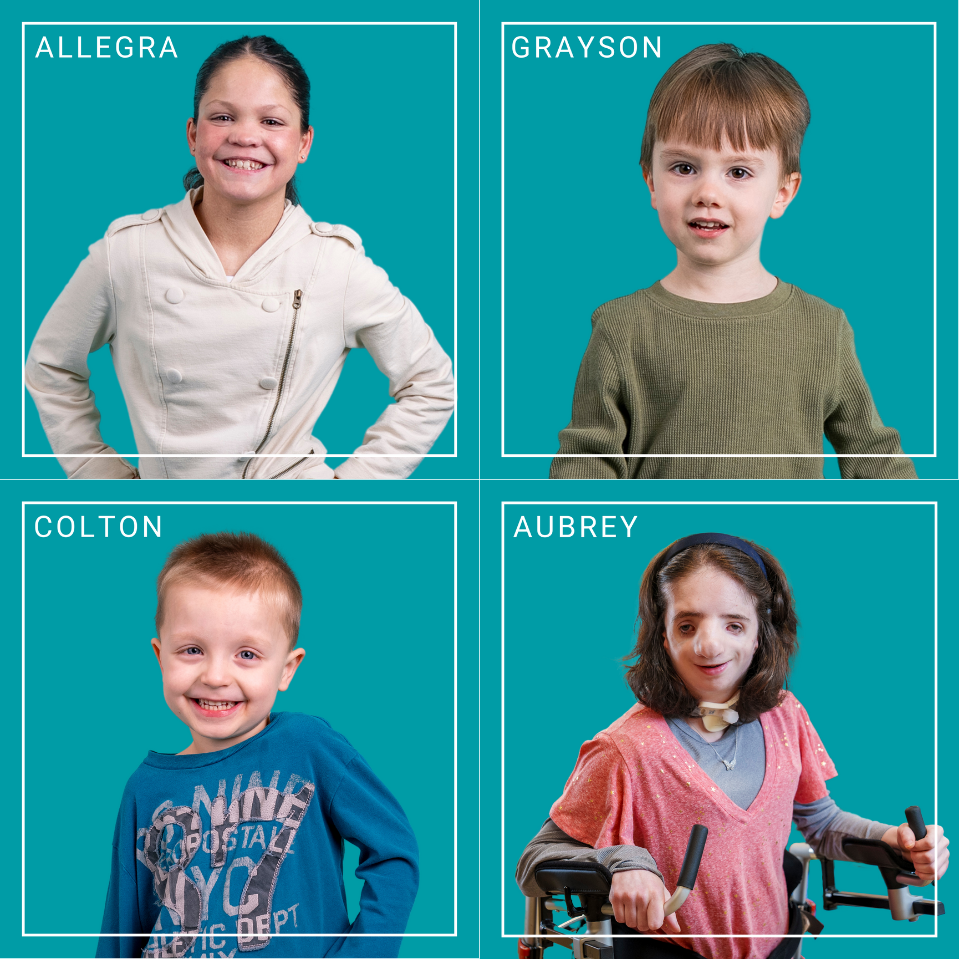
From oldest to youngest, we’d like to now introduce you to our 2024 Ambassadors, Aubrey Jacoby, Allegra Essis, Colton Kiss, and Grayson Smith.
Aubrey Jacoby
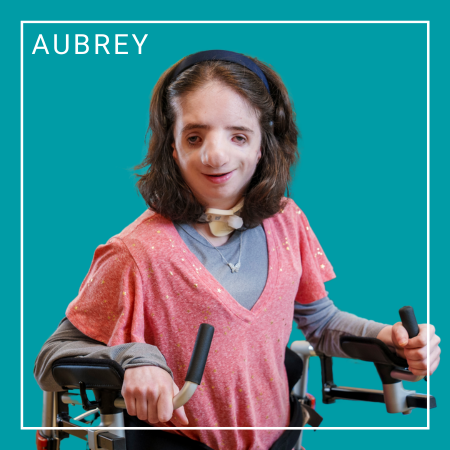
Aubrey is an 18-year-old, senior in high school, with a passion for video editing and a love of music. She has been a Schreiber client since she was three years old, when she began therapy sessions to counteract the physical effects of her cerebral palsy diagnosis. Through physical therapy and occupational therapy sessions Aubrey has gained and sustained both gross and fine motor skills that help her navigate through life as independently as possible.
Aubrey has undergone over 80 surgeries in her lifetime to combat difficulties associated with her diagnoses of both cerebral palsy and Treacher Collins syndrome. Because she had difficulty breathing one of these surgeries was to insert a tracheostomy tube, creating an opening in her trachea from the outside of the neck to help oxygen reach her lungs. She began speech therapy at Schreiber after that surgery and re-learned how to speak with the trach and use an augmentative and alternative communication (AAC) device to communicate with the world and has since graduated from speech therapy. Just like most 18-year-olds she’s excited to graduate from high school next, and start working on building a career for herself.
Allegra Essis
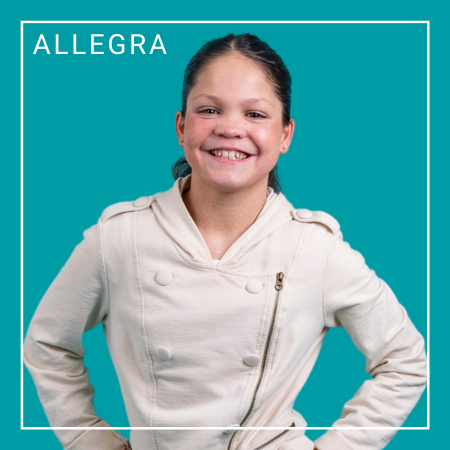
Allegra is 13 years old and in her last year of middle school, where she is a social butterfly with a flair for theater. When she was just an infant her parents enrolled her in early intervention therapy care to combat challenges she was facing with her gross motor skills. At five years old she was diagnosed with cerebral palsy and has been a frequent flyer at Schreiber for physical therapy ever since. During her time at Schreiber sha has gained a lot of core strength, flexibility, balance, and of course confidence which all help her pursue her interests in dance, horseback riding, and skiing.
Early on, Allegra had difficulties standing up, walking, running, balancing, and using stairs. Her parents’ initial goals were for her to gain the strength and balance needed to walk independently. She was fitted for orthotics to help stabilize her gait and help her do these activities, which she continues to use today. A recent surgery on her hamstrings set back her progress slightly when it left her wheelchair bound for a time. Through dedicated physical therapy sessions at Schreiber three times per week, she is now back to her normal, walking independently and participating in her many activities.
Colton Kiss
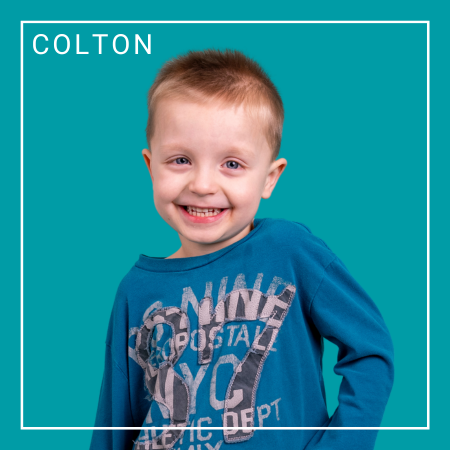
Colton is almost four years old, and attends our Circle of Friends Academy preschool, where he enjoys learning and playing with his friends. He has attended therapy at the Schreiber center for three years, after a complication at birth resulted in four brain hemorrhages as well as a blood clot on his cerebellum that caused permanent damage. Shortly after he was born his mom was told by doctors that he may never walk or talk due to the damage done. His mom was familiar with Schreiber and knew that our center was his best chance at beating those odds.
He currently participates in all four of our offered therapies, physical, occupational, speech, and behavioral health to help him combat the challenges of his diagnosis. Please who have known Colton through his entire journey have witnessed the miracle of his transformation. And people who meet Colton today would never believe that there was ever a chance that he may have never learned to walk or talk. His physical therapy sessions have helped him build core strength and balance needed to sit, stand, and walk on his own. Occupational therapy has helped him develop the coordination and focus needed to perform self-care tasks like dressing himself and feeding himself. Speech therapy has given him the ability to communicate his wants and needs with those around him. And behavioral health therapy has taught him how to communicate those wants and needs more appropriately.
Grayson Smith
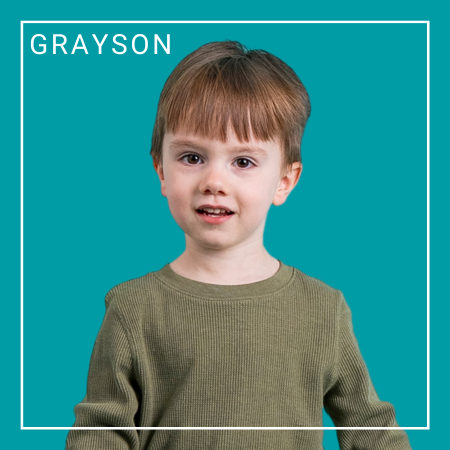
Grayson is three years old and has attended therapy at Schreiber since he was just nine months old. First for physical therapy to address a diagnosis of low tone, where he built the strength and coordination required to sit, stand, walk, and run on his own. A year after starting and later graduating from physical therapy he was also diagnosed with level 1 autism. At which time he began speech therapy and occupational therapy to help him gain both physical and social skills.
Once a week, he still comes to the Schreiber center to work on his sensory processing skills, social skills, and self-care tasks in occupational therapy. He uses the skills he learns in therapy every day to express his wants and needs effectively with those around him and navigate through new social situations that would have had him shutting down in the past. Thanks to occupational therapy he is also now able and willing to perform daily self-care tasks on his own and with the help of his parents without a struggle. His parents are confident that the tools he’s learning in therapy will ensure that he is developmentally ready for school in the next few years. His confidence has already grown tremendously as he learns to self-advocate and even initiate new friendships on the playground.


While each of our 2024 ambassadors have been attending therapies at the Schreiber center for a few years, we will be highlighting their progress and achievements on our social media channels this year to allow our friends and supporters to witness firsthand what makes our pediatric therapy center so special. So, make sure to follow us on Facebook and Instagram to watch their stories unfold.

We’ve also made fun collectible trading cards for each of our 2024 ambassadors to hand out to fellow Schreiber families, friends, and supporters during our various fundraising and community events throughout the year. These cards highlight the therapy journey of each ambassador and celebrate how far they have each come. Attend all our events and collect each ambassadors trading card for special keepsake showcasing your support of all Schreiber kids.
Help Schreiber Kids like our Ambassadors receive the care they need, by donating in support of our Kids’ Care Fund, a long and short term savings account used to cover the costs of uncompensated care.
As a nationally recognized pediatric facility, the Schreiber Center for Pediatric Development provides family-centered education and therapy programs for infants, children and adolescents with disabilities, developmental delays, and acquired injuries. Our goal-oriented approach maximizes each child’s ability to function independently within the community.
General Monthly eNewsletter Sign Up
Sign up to receive monthly newsletters to your email box to learn more about what is going on at the Schreiber Center, and how you can help support our mission to help every child in need reach their fullest potential.
OASUS Harness System Takes Pediatric Physical Therapy to New Heights at Schreiber Center
January 18, 2024The new physical therapy gym at the Schreiber Center for Pediatric Development is now open! This state-of-the-art facility is equipped with a range of innovative equipment and open spaces, all meticulously designed to enhance therapy sessions for all our PT patients. This environment allows for more personalized therapy in a warm and inviting atmosphere, filled with natural light, vibrant colors, and a sense of fun. It is particularly welcoming to our young patients, putting them at ease, making them more receptive to therapy, and eager to engage in their rehabilitation.
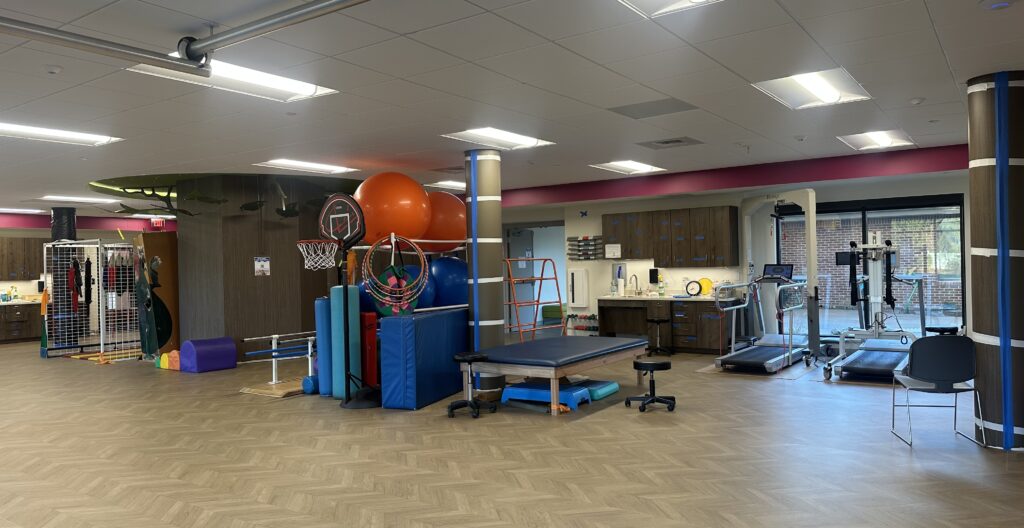
One of the most exciting features of our new gym is the introduction of the OASUS Harness System, a cutting-edge bodyweight support system that takes pediatric physical therapy to the next level. Provided by Enliten LLC, this system offers a flexible and dynamic approach to gait training, enabling our young patients to experience a greater range of motion, including rotational and frontal plane movement. This added versatility is crucial in helping our children develop their motor skills, balance, and coordination. The OASUS system also incorporates bungee cords, encouraging active engagement and fostering independence, thus strengthening their muscles and overall physical development. Furthermore, it simplifies therapists’ work on important milestones like stair climbing.

Our new rock wall adds a fun and challenging element to physical therapy sessions for many of our clients. Climbing the rock wall helps children build strength, coordination, and self-confidence while enjoying the process. Combining engaging activities with therapeutic methods is just one way our physical therapists help children reach goals others didn’t believe possible. We’ve expanded our gym to include new exercise equipment, including stationary bikes, to further this goal.
Safety is a top priority at Schreiber, and we’ve updated our mat tables to provide a comfortable and safe surface for various therapeutic exercises and activities in the new gym. These tables offer enhanced support for our children during stretching and strengthening routines, creating a more conducive environment for their rehabilitation.
“The new gym has provided us with more space and flexibility for personalized therapy. It is very inviting and bright and fun. The several new additions including the OASUS, rock wall, and new mat tables allow us to have even more treatment options to provide the best therapy to the kids that we serve.”
– Laurie Panther, Physical Therapist at the Schreiber Center.
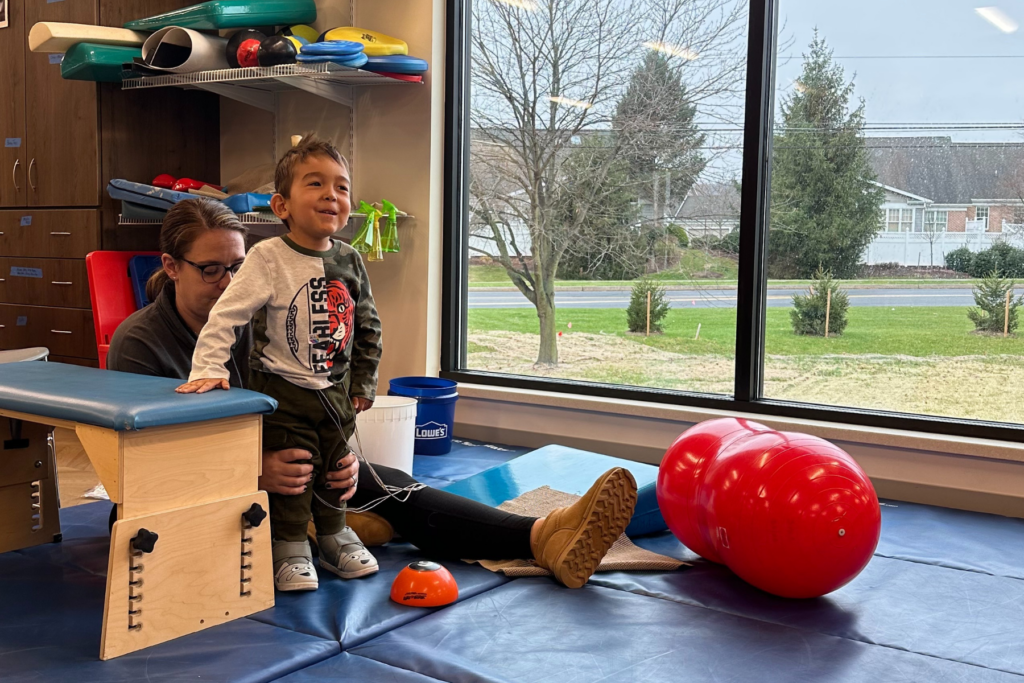
Have you ever seen a tree in the middle of a PT gym? If you’ve had sessions in ours, you have. And soon, we’ll be introducing sensory boards and other vertical play areas to enhance our therapy sessions even further on this tree. These additions will provide opportunities for sensory integration and cognitive development. Just another example of how we’re making therapy not only effective but also enjoyable for our young patients.
While the main gym is complete and open to clients, we are still working on completing extra treatment rooms dedicated to casting and pelvic floor treatments, greatly enhancing the level of care we can offer. These specialized rooms will ensure that our children receive the individualized attention they deserve, with access to the specific therapies they require.
The new physical therapy gym at the Schreiber Center stands as a testament to our commitment to the children and families we serve. We are deeply grateful to our supporters, donors, and partners who have made this space possible. Stay tuned for updates as we continue our renovations throughout the center to bring our clients the most innovative and up-to-date technology and services available. The future is bright at the Schreiber Center, and we can’t wait to share it with you!
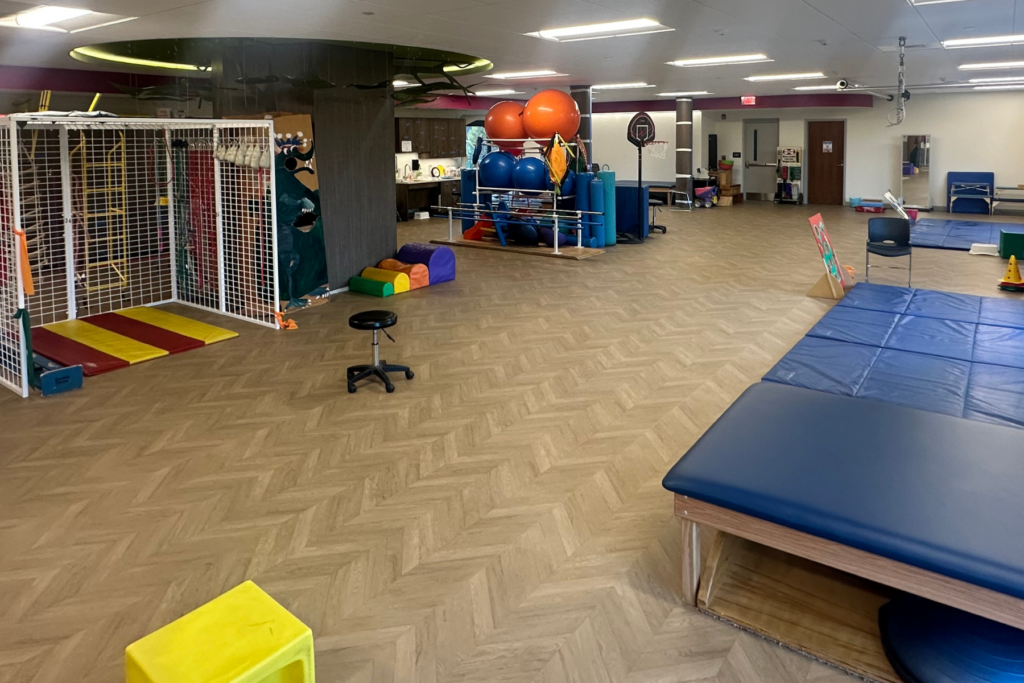
Donate today to help us continue to update and improve our spaces so that we can provide quality care to more children in need.
As a nationally recognized pediatric facility, the Schreiber Center for Pediatric Development provides family-centered education and therapy programs for infants, children and adolescents with disabilities, developmental delays, and acquired injuries. Our goal-oriented approach maximizes each child’s ability to function independently within the community.
Thank You to our 2023 Ambassadors!
December 31, 2023As we reflect on 2023, we are filled with gratitude for the amazing kids and families who have allowed us to spotlight their journeys through our therapy services, the true champions of our mission – our 2023 Schreiber Ambassadors!

It is through your tireless efforts that you’ve helped spread awareness about the vital work we do at Schreiber. Your advocacy has not only shone a spotlight on the challenges faced by those we serve but has also illuminated the pathways to hope and healing that our organization provides.
Your participation in our fundraising initiatives has been nothing short of extraordinary. By leveraging your networks and utilizing your influential voices, you’ve helped reach and exceed our goals all year so that we can continue making a meaningful difference in the lives of all #SchreiberKids. Your commitment to the betterment of our community is not only commendable, but also deeply appreciated.
As we express our gratitude, we also want to acknowledge the impact you’ve had on fostering a sense of community and belonging within the Schreiber family. Your enthusiasm has resonated with others, creating a ripple effect that strengthens the bonds of support and solidarity among those who share a connection to our organization.
In recognition of your exceptional contributions, we want to express our deepest appreciation. Your willingness to be ambassadors for Schreiber has not only elevated our mission but has also touched the hearts of those who have had the privilege of hearing your stories.
Thank you, 2023 Schreiber Ambassadors, for everything you’ve done to support our mission this year!
Support the therapy and education of our current and future Schreiber kids by donating to our Kids’ Care Fund today!
As a nationally recognized pediatric facility, the Schreiber Center for Pediatric Development provides family-centered education and therapy programs for infants, children and adolescents with disabilities, developmental delays, and acquired injuries. Our goal-oriented approach maximizes each child’s ability to function independently within the community.
Join the Chairman’s Challenge and Become a Hero for Schreiber Kids
December 12, 2023When you enter Schreiber, you enter a world of possibility and hope filled with stories of resilience and triumph. Here, families navigate through challenges, therapists dedicate themselves to transformative work, and children, with unwavering determination, engage in therapy sessions with radiant smiles. These are the individuals we celebrate at Schreiber, and it’s their stories that propel us forward in our mission.
As the chair of the Where HEROES are Made capital campaign and a proud father of a Schreiber graduate, Jeff Bankert is leading an exciting new initiative – the Chairman’s Challenge.
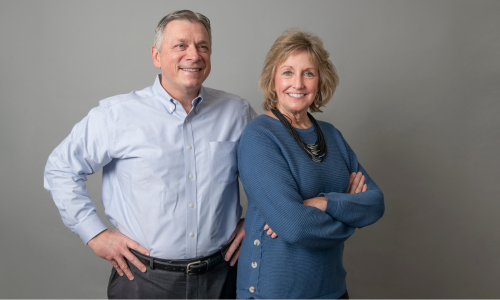
Having witnessed firsthand the transformative impact of Schreiber’s services on his own son, Jeff invites the community to join him in securing the future of the Kids’ Care Fund. This fund is more than just a financial initiative; it’s a promise to our community’s future generations. With your support, we can eliminate waiting lists and ensure that children, regardless of their family’s financial circumstances, receive the care they need.
On average, insurance and government assistance fall short on reimbursements by $74 per therapy session, resulting in a staggering $2.7 million in unmet costs for the Schreiber Center in fiscal year 2022. The Kids’ Care Fund addresses this gap, ensuring that families, like the Schaefer’s, whose children attend Schreiber for multiple therapies, are not burdened by the financial strain. Your contribution to the Kids’ Care Fund is an investment in the well-being of children like Katelyn and Kalvin, and it will help us carry forward the legacy of care initiated by our founder, Edna Schreiber, 87 years ago.
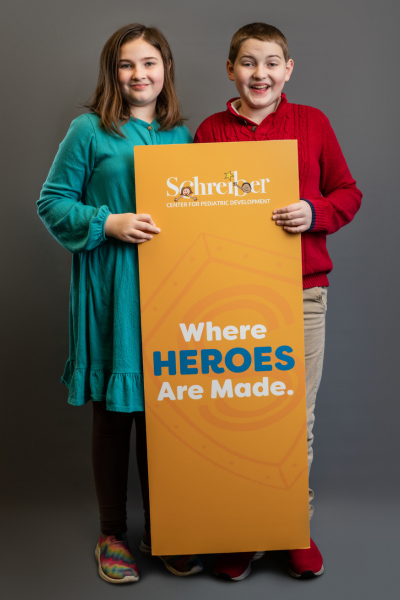
“They give a lot…beyond what they’re supposed too, and we appreciate it.”
– Kevin Schaefer, dad of Katelyn and Kalvin
Participating in the Chairman’s Challenge and donating to the Kids’ Care Fund is easy and rewarding. The Schreiber Center welcomes gifts in various forms, from immediate cash donations to multi-year pledges and transfers of assets like stocks, life insurance, or qualified charitable distributions. All contributions of $10,000 or more will be recognized on our ‘Schreiber Heroes’ wall, located inside our new pavilion. For gifts of $25,000 or more, you have the opportunity to name a space within our facility, leaving a lasting mark on Schreiber’s legacy.
Jeff Bankert and his family have pledged $25,000 to match all gifts received between now and the end of 2023. By participating in the challenge, you’re not just making a financial contribution – you’re investing in the well-being and future of Schreiber kids and their families.
Visit www.schreiberpediatric.org/where-heroes-are-made-campaign to make your contribution today and be a part of this incredible initiative.
As a nationally recognized pediatric facility, the Schreiber Center for Pediatric Development provides family-centered education and therapy programs for infants, children and adolescents with disabilities, developmental delays, and acquired injuries. Our goal-oriented approach maximizes each child’s ability to function independently within the community.
ExtraGive Funds Pediatric Therapy at Schreiber
October 31, 2023Every child deserves the opportunity to lead a healthy and fulfilling life. At the Schreiber Center for Pediatric Development, we are committed to ensuring that every child, regardless of their abilities or financial circumstances, has access to the quality care they need.

The ExtraGive event (https://www.extragive.org/) is a remarkable opportunity for us to come together as a community and make a significant impact on the lives of children who rely on our pediatric therapy programs. Your generous donations during the ExtraGive event will directly benefit our occupational, physical, speech, and mental and behavioral health therapy programs, as well as our “Kids’ Care Fund” designed to cover uncompensated care expenses.
Pediatric Occupational Therapy: Feeding Program
Pediatric occupational therapy is a crucial component of the services we provide at Schreiber Center for Pediatric Development. Many children face challenges related to feeding and nutrition, and our goal is to support them in developing the necessary skills for a healthy diet. Your donations will help us establish a new feeding program that will provide personalized support to children with various feeding difficulties.
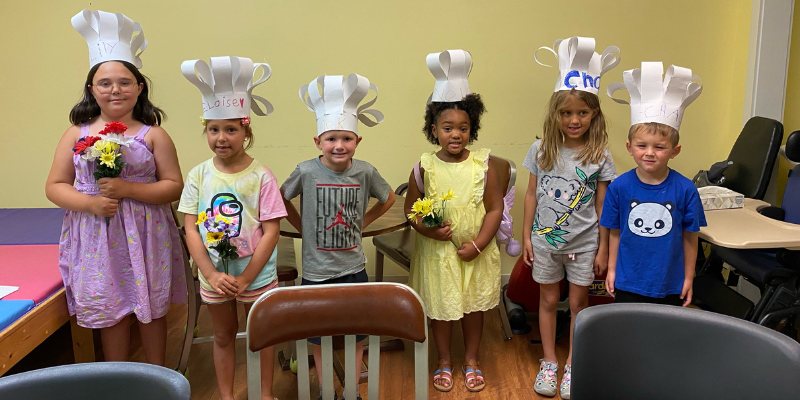
Feeding issues can be a source of tremendous stress for families, and your contributions will make it possible for us to offer specialized therapy, equipment, and resources to help these children develop the skills they need to thrive.
Pediatric Physical Therapy: Medical Mobility Equipment

Children with mobility impairments often require specialized equipment to enhance their mobility and independence. The funds donated during the ExtraGive event will be instrumental in acquiring essential medical mobility equipment for our pediatric physical therapy program.
These devices can be life-changing for children, enabling them to participate in everyday activities and improving their overall quality of life. Your support will help us ensure that no child in central PA is left without the necessary equipment to navigate the world around them.
Pediatric Speech Therapy: Communication Devices
Communication is a fundamental aspect of a child’s development, and for some children, it can be particularly challenging. Our pediatric speech therapy program is dedicated to helping children develop their communication skills, and your donations will play a pivotal role in achieving this goal.
We aim to provide augmentative and alternative communication (AAC) devices, speech-generating devices (SGDs), and other assistive communication tools to children who need them. These devices empower children to express themselves, connect with others, and engage with the world in meaningful ways.

Mental and Behavioral Health Therapy: After-School Social Programs
At Schreiber Center for Pediatric Development, we recognize the importance of mental and behavioral health in a child’s overall well-being. Your donations will support our after-school social programs, including the popular “After-School Lego Club,” designed specifically for children with autism.
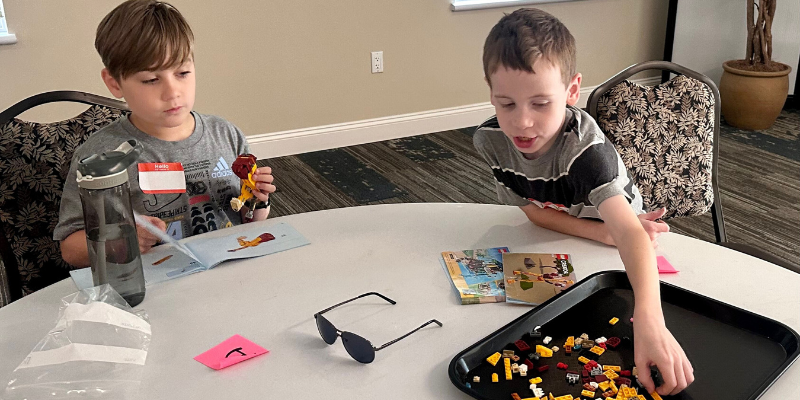
These programs offer a safe and supportive environment where children can develop social skills, build friendships, and gain confidence. Your contributions will enable us to expand these programs, reaching even more children who can benefit from them.
The “Kids’ Care Fund”: Ensuring Access to Care for All
In addition to directly supporting our therapy programs, your generous donations during the ExtraGive event will be added to our “Kids’ Care Fund.” This fund serves as a safety net, ensuring that all disabled children receive the care they need, regardless of their families’ financial circumstances.
The “Kids’ Care Fund” is a savings account that bridges the gap between what private insurance and Medicaid supplements cover and the actual cost of care. At Schreiber Pediatric, we have always made the promise that no child will be turned away, and your contributions help us fulfill this commitment.

Your support during the ExtraGive event will have a profound and lasting impact on the lives of the children we serve through our pediatric therapy programs at Schreiber Center for Pediatric Development. Whether it’s helping a child improve their feeding skills, providing essential mobility equipment, enabling communication, or fostering social connections, your generosity makes it all possible.
Furthermore, your donations will contribute to the “Kids’ Care Fund,” ensuring that no child is denied the care they deserve due to financial constraints. Together, we can make a difference in the lives of Schreiber kids and their families, offering hope, support, and a brighter future. Join us in transforming lives and creating a more inclusive and compassionate community for all children in central PA. Donate during the ExtraGive event and be a part of something truly extraordinary.
Sam Leon-Durkee: Young man with a plan
April 19, 2022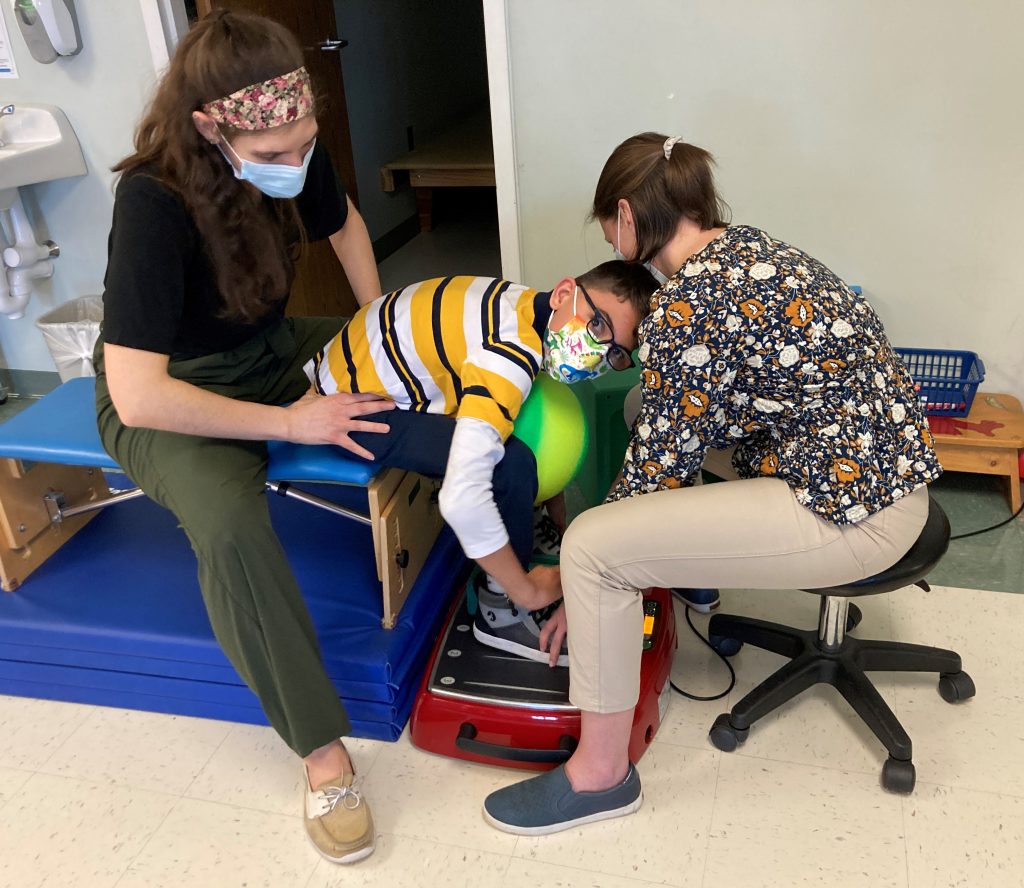
Sam Leon-Durkee started a recent physical therapy session working on a piece of equipment called a Galieleo vibration plate. He sat down on a bench, put his feet on the plate and, with the help of his physical therapist, Rachel Saufley, worked on standing up.
Sam was diagnosed with cerebral palsy at 18 months. He’s 12 now, and does a lot of work to increase his flexibility and mobility. The vibration plate helps reduce the muscle spasticity, or tightness, associated with CP so he can have a more effective therapy session.
Schreiber acquired the vibration plate in December thanks to a grant from the Gamber Foundation. Rachel said she uses it with Sam to help stretch his hamstrings. Sam put it a little differently.
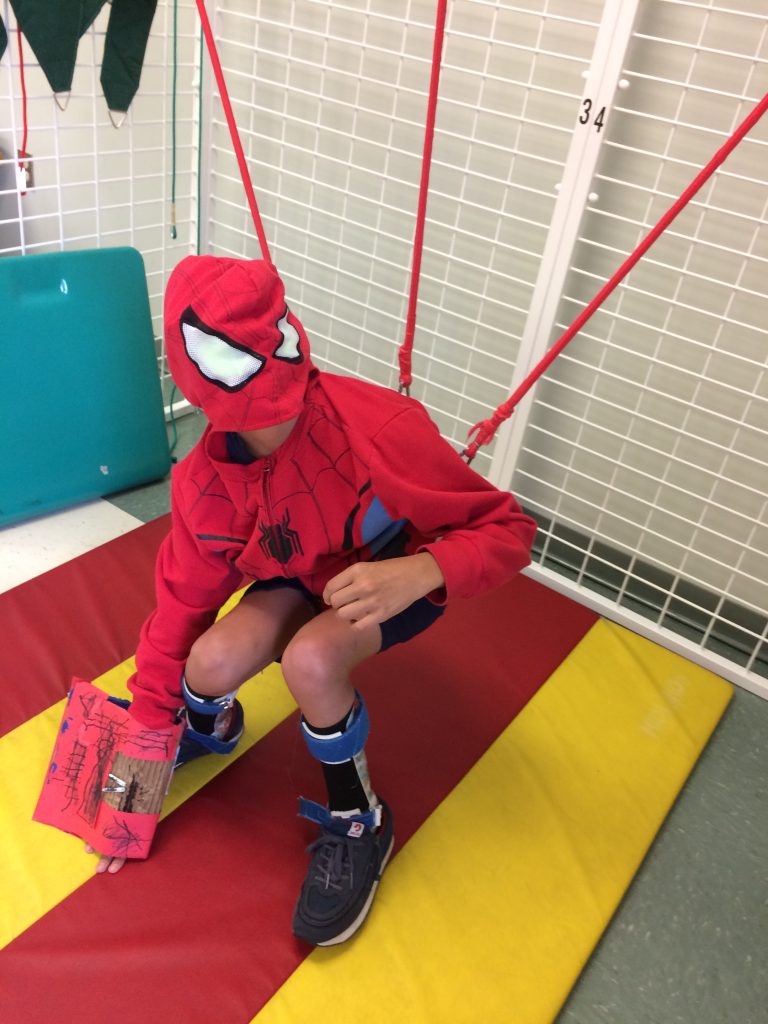
“It’s something new to torture the kids,” he said. “And by torture I mean help.”
He said it like he says a lot of things: with a mischievious smile.
His cerebral palsy makes it hard for him to walk or hold a pencil to write his name. But it has done nothing to hinder his social development.
He’s a talker, a natural storyteller with a vivid imagination and a quick sense of humor. His mom Casey Trone said Sam wants to work at Marvel Comics in New York City.
“I think he’s going to single-handedly write the next Marvel movie,” she said.
That’s the plan right now. For that to happen, there’s still a lot of work to do. Given how far he’s come, though, nobody would bet against it.
Sam was born prematurely in August 2009 and spent five months in the neonatal intensive care unit at Hershey Medical Center. Casey said she started Early Intervention services with Schreiber as soon as she received the diagnosis.
The EI services continued until he was 3. He had a muscle-lengthening surgery at age 4, which helped him make a lot of progress. A year or so later, he returned to Schreiber to resume physical therapy. Around the same time, he started school, first enrolling in Head Start when he was 4 and then starting kindergarten the next year.
“I was a little reluctant,” said Casey, who lives in the Penn Manor School District. “I would have liked to have a little more time for him to develop physically. But he did really well in kindergarten. He’s had an aide with him every year, so the support has been really good.”
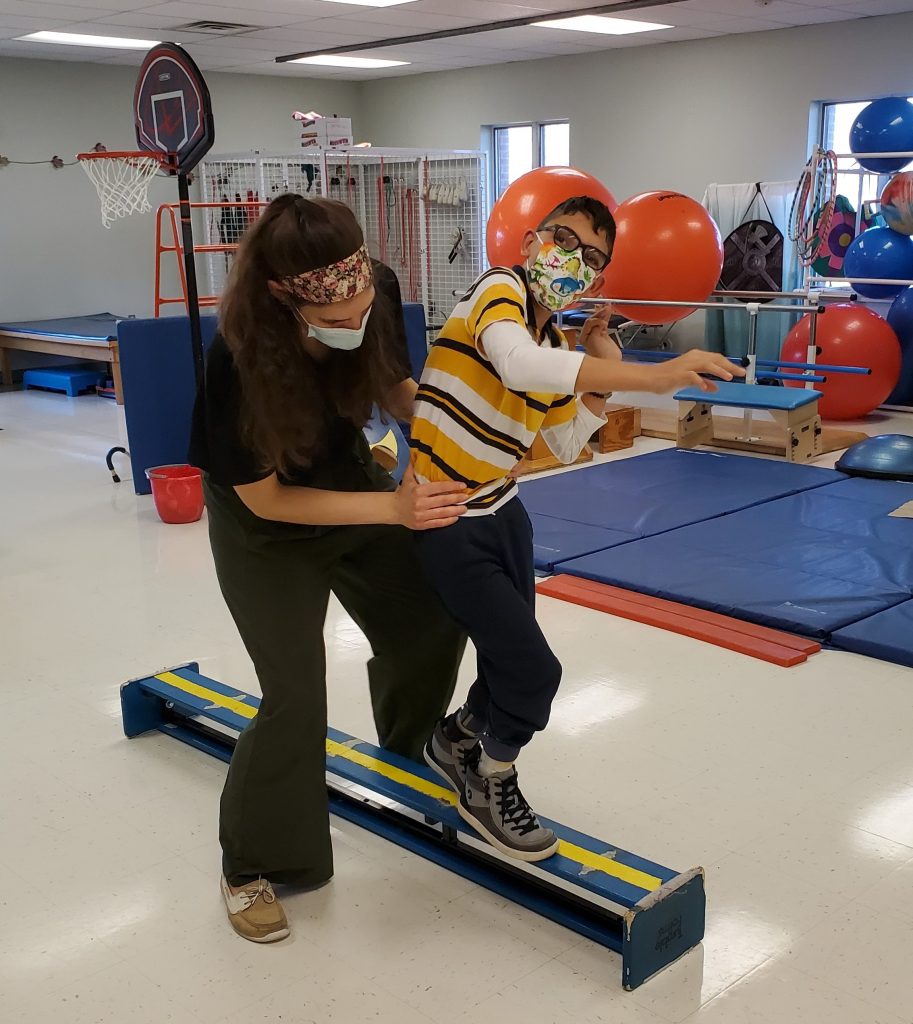
He has continued to do well in school, including his middle school years at Manor Middle School.
“He has shocked me,” Casey said. “I remember when I first got the diagnosis of CP, I had no idea what was going to happen. There are so many different forms of the disease. I went so far as to have weight-loss surgery because I didn’t know whether I was going to be able to take care of him. But he’s doing very well.”
A lot of that she attributes to their experience at Schreiber.
“It’s helped me to understand what is possible and what to do and how to take the next step with him,” she said, her voice cracking and a tear rolling down her face. “My life now is to get him to be the best he can be.”
The physical challenges haven’t been the only ones for Casey, Sam and Sam’s twin sister Isabelle. The twins’ father, Henry Leon-Rivera, passed away in 2016. Two years later, Casey brought Mike Trone into their lives.
“They were just about to turn 8,” Mike said. “When we met the first time, we went out for ice cream. We talked a lot about the ‘Cars’ movies. He’s a smaller guy, and he was even smaller then. But he can talk. He knows what he’s talking about. And he has comedic timing. He’s full of life.”
Now it was Mike’s turn to wrestle with his emotions, and he reached over to grasp Casey’s hand.
“I’ve learned so much from him,” he said finally. “I didn’t know anything about CP when Casey and I met. I guess I had a picture in my mind. And he was nothing like that. Resilience is how he approaches day-to-day life. He’s definitely changed my outlook on the world.”
And now the three-person family is four: Casey and Mike married in 2021. She’s financial coordinator with the Library System of Lancaster County. He’s a Realtor with Keller Williams Keystone. Together, they are rebuilding life as a family. And coming to Schreiber to help Sam become his best self, to fulfill his plans of telling the next stories in the Marvel universe.
“I work really hard every day to give Sam the best life I can,” she said. “And I know he meets me halfway to give his best. We all do what we gotta do, and we’ll get there.”
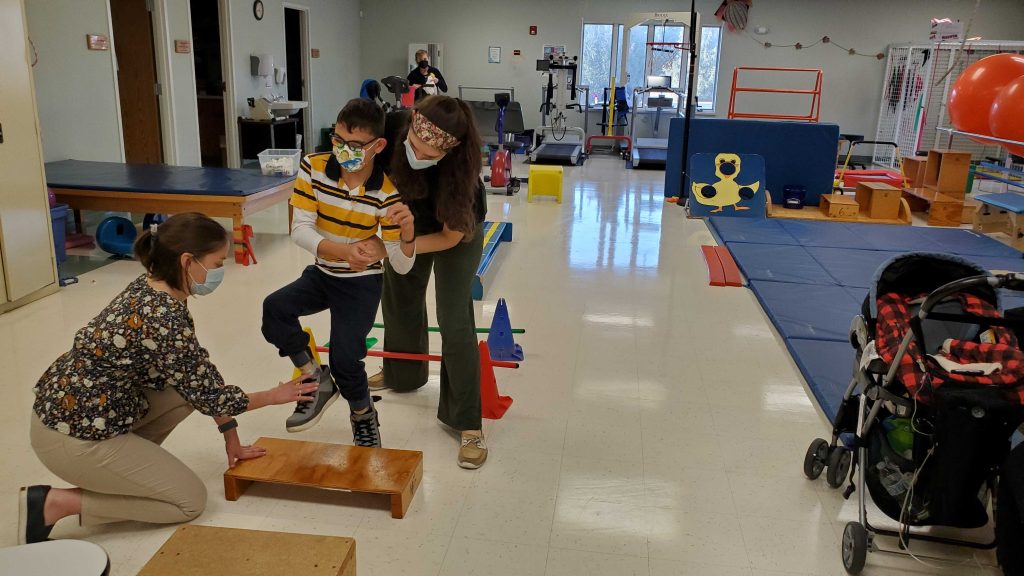
Ellery McIndoe learns to soar at Schreiber
March 29, 2022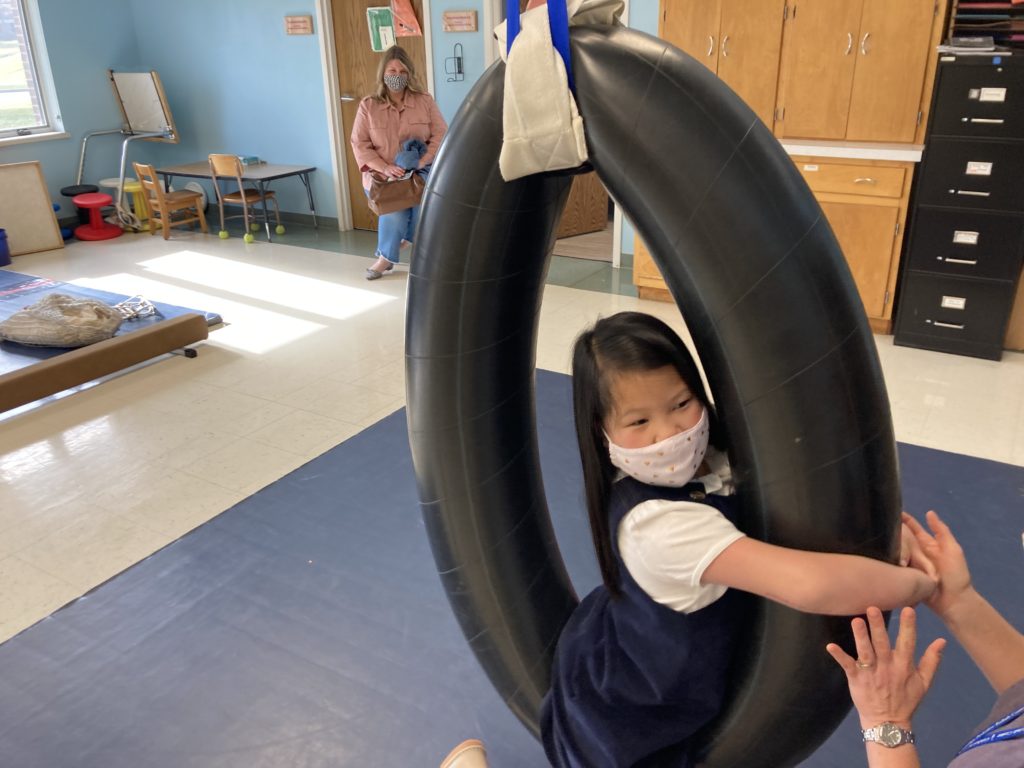
Ellery McIndoe has had challenges most people can’t imagine. She also has lots of personality, a big, bright smile and a ton of can-do spirit. In the scheme of things, the challenges don’t seem to be holding her back from being a happy, active, smart 7-year-old little girl.
For her mom Alison, though, getting to this point hasn’t been the easiest journey.
Ellery was born in China, and she spent the first five years living in the orphanage system that China maintains to care for children the government considers to have severe special needs.
Alison, a single parent, had wanted to adopt a young child from China, and she spent several months looking at the profiles of different children with special needs.
“It was a little scary initially,” Alison said. “I passed her by the first few times. You don’t necessarily know the extent of their situation. It could be a heart condition. It could be blindness. I knew very little about her condition.”
She finally learned that Ellery had been diagnosed with arthrogryposis, a rare condition that developed in utero. The condition causes contractures, where one or more joints become permanently fixed in a bent or straightened position, and muscle weakness. Alison knew Ellery had some surgeries in China but not much else about her care.
She adopted Ellery in November 2019. First, she had to help Ellery adjust to her new situation. Five years old, living in a new country with a new language and a new family — it was overwhelming.
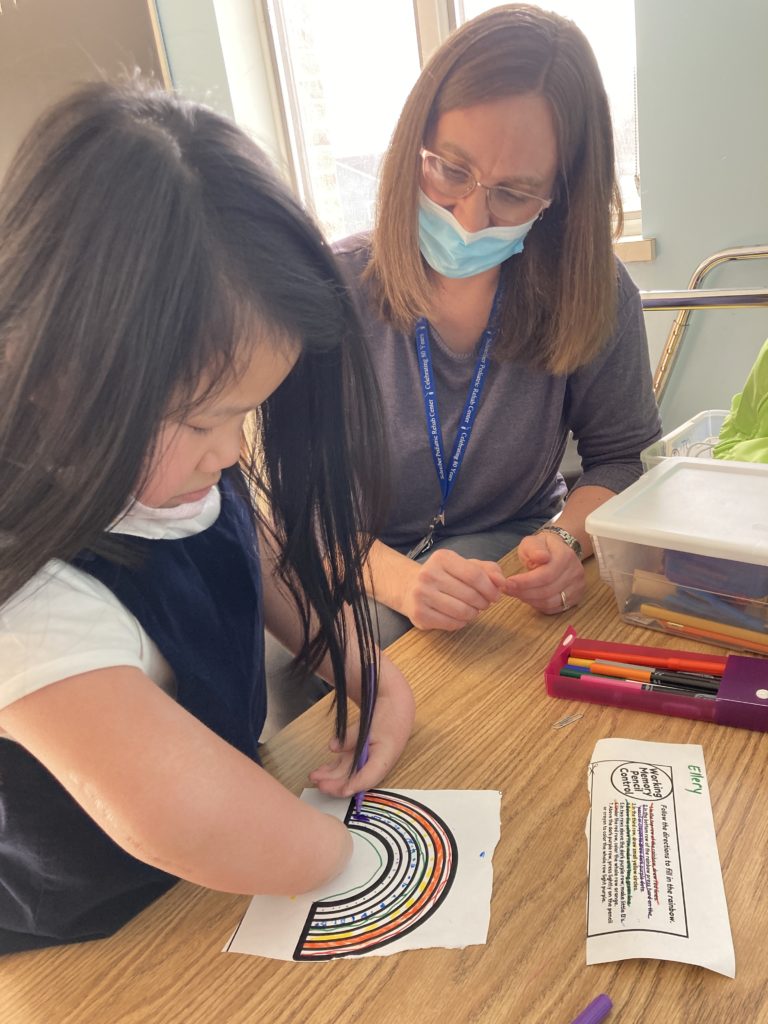
“She was very timid and very frightened the first few weeks,” Alison said. “I could literally not be out of her sight at all. She came to work with me, even meetings with clients, and she would just sit there and pretend to take notes, like I did. Or she would make pretend phone calls. She likes to do whatever Mama does.”
Then Alison went to work finding the medical care Ellery needed, starting with surgeries at Nemours Children’s Hospital in Wilmington, Del. In the summer of 2020, doctors operated on her right elbow, wrist and thumb, with the goal of giving her more flexibility in the affected joints and improving her fine motor skills so she would better able to do daily tasks like feeding herself.
They started coming to Schreiber for services about a year ago. Ellery receives occupational therapy with Amy Mostellar and physical therapy with Christen DeSarro.
“In OT, it’s really a struggle to figure out ways to help her care for herself,” Alison said. “She has fingers, but they don’t move a whole lot. She’s learned to adapt. She can do a lot with her toes: She can color, and she can almost tie her shoes. She loves to swim.
“Just the fact that she sees she can do these things gives her so much confidence. … She just runs with it. She beams.”
Ellery’s newfound confidence shows up in little ways. Like when she smiles and laughs and squeals, “Push me higher,” on the swing in OT.
When she first started at Schreiber, she had trouble grasping her hands together to hold on while she swung. Now? No problem. Those little fingers are stronger.
Or the way she can maintain her balance in PT.
“When she started, she fell all the time,” Alison said. “I worried about her. I thought I might have to get her a helmet, because when she falls, she can’t really catch herself with her arms. Now, she rarely falls. Her balance is so much better. She can walk up the steps now by herself.”
Alison paused.
“I’m still close by though,” she added, with a smile.
She described the progress as slow and steady.
“You almost don’t realize it’s happening. But then you see her on the swing and you think: ‘She couldn’t do that before.'”
The shy, quiet 5-year-old has given way to a confident, bubbly 7-year-old, a foodie (she loves anything spicy) who enjoys sewing (with her feet!) and play dates with friends.
And her experience at Schreiber has played an important part of that evolution.
“(Schreiber) is a wonderful place, and we’re so thankful this is here. This is a joyful place, and Ellery fits right in.”
Carter Peiffer: Back from the brink
March 17, 2022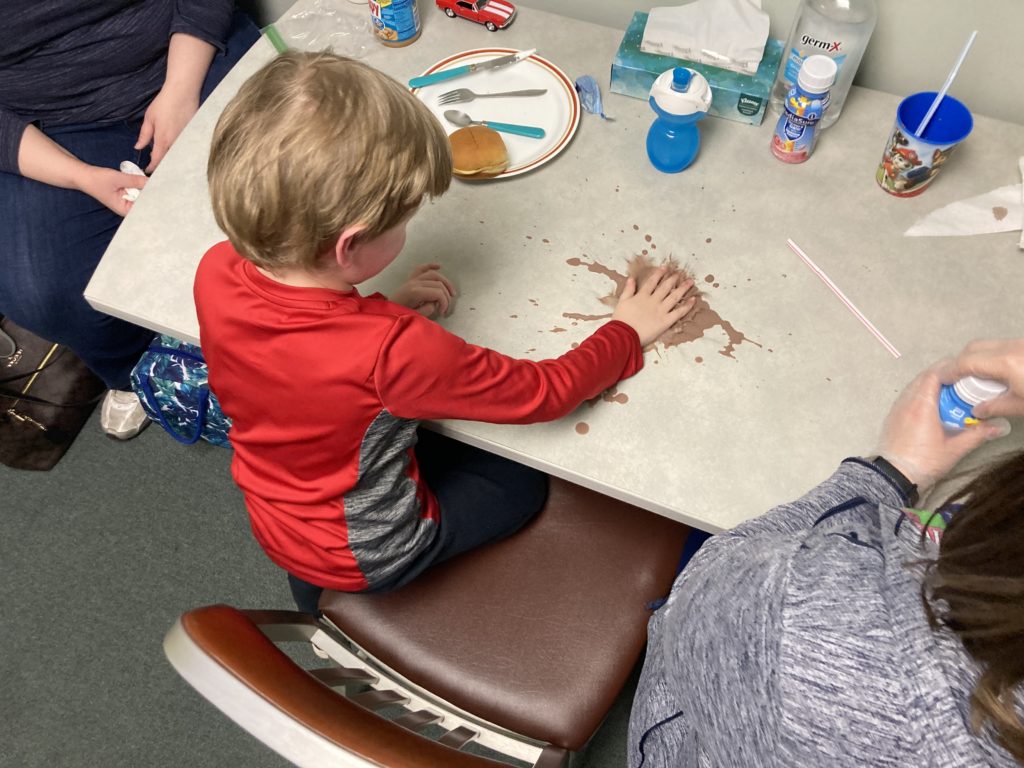
For Carter Peiffer, an occupational therapy session with Sarah Terry will usually involve food. And making a mess with food.
The mess is by design. A puddle of PediaSure on the table is fair game for Carter to write his name in, drive a toy car through or give a sip to Elmo. He might pull a straw from a cup filled with the nutrition drink and sniff (good) or take a tiny taste (better) from the end of the straw.
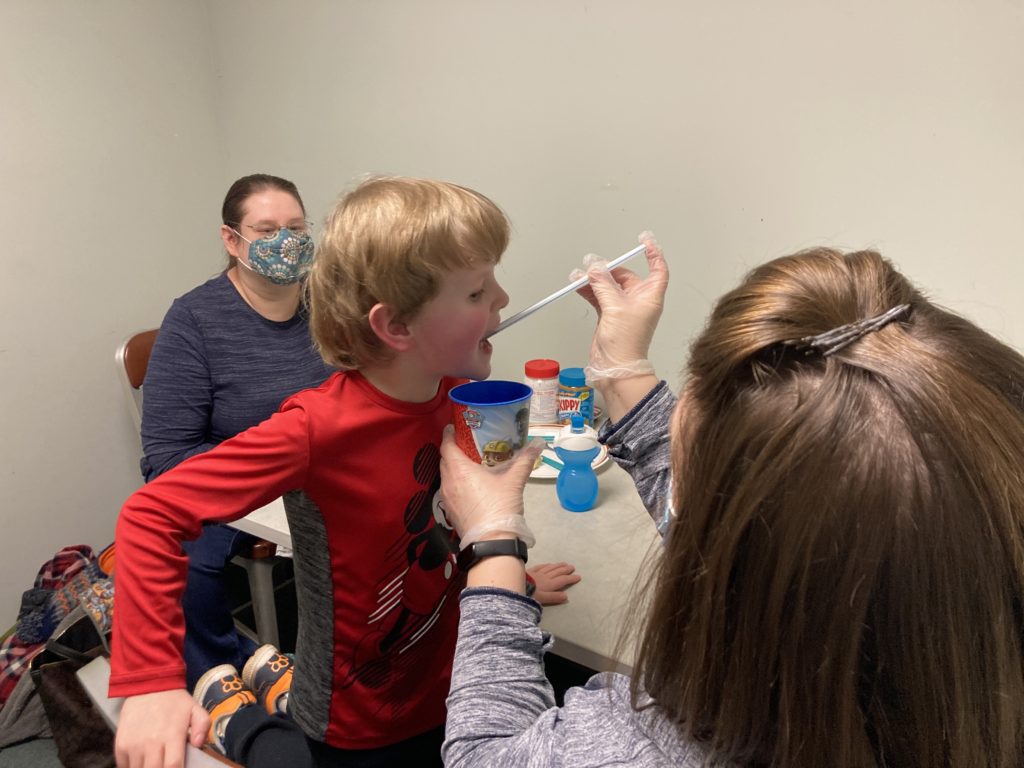
It’s all about making food fun for Carter, giving him positive experiences. He and food have had a rough two years. Through a series of life events, Carter went from a happy, active 2 year-old who would eat lots of different foods to a 4 year-old who would only eat strawberry banana yogurt — and it had to be Gerber’s. The lack of variety and nutrition in his diet over time left him with a severe vitamin C deficiency and a case of what used to be called scurvy. That caused his bones and muscles to weaken, to the point where his bones became brittle and he couldn’t walk or even stand without help.

Let’s go back to the beginning. When he was 2, his mother Desiree said she noticed Carter was a little delayed in speech. But he was otherwise active and healthy. Then he gradually began to cut out some foods, starting when Carter’s brother was born. Around the same time, his grandmother was in the hospital for an extended period following heart surgery.
These new stresses in his life caused him to become even more picky with his eating, to the point where all he would eat was the yogurt.
In March a year ago, Carter was running around playing when he tripped and fell. He ended up breaking the growth plate in his left knee, which required a knee immobilizer. A month later, he fell again — still wearing the immobilizer on his right knee — and broke the growth plate in his other knee.
After another round of medical visits, doctors at Children’s Hospital of Philadelphia in May found multiple tiny fractures in his bones and sent him to CHOP’s emergency department for an immediate, intensive examination.
Their conclusion: Carter’s increasingly limited diet for more than a year had caused a dangerous vitamin C deficiency that had weakened his bones and left him susceptible to fractures. His overall medical state was as fragile as his little brittle bones.
He spent nine days at CHOP in May receiving treatment and starting inpatient therapy. Later that month, after he was sent home, Desiree called Jen Bachman, our social services director, to arrange starting services at Schreiber.
In early June, Carter had his first physical therapy visit. After not being able to put any weight on his legs because of his knee injuries, step one in his recovery was relearning how to walk. He did aquatic therapy in our therapy pool with Megan Campbell Roland, and PT in the gym with Laurie Panther.
Desiree said Laurie noticed some sensory issues and suggested Carter be evaluated for occupational therapy. In September, doctors diagnosed him with autism and sensory processing disorder, and he started working with Sarah for OT. The work there has focused on helping him expand the variety of foods he ate.
“Carter, what did you eat today?”
Sarah asked the question at the start of a recent therapy session.
“Some peanut butter bread, and I ate some hot dog!”
“You did not,” Mom said. She smiled and gave him a what-are-you-talking-about look. “You had some yogurt.”
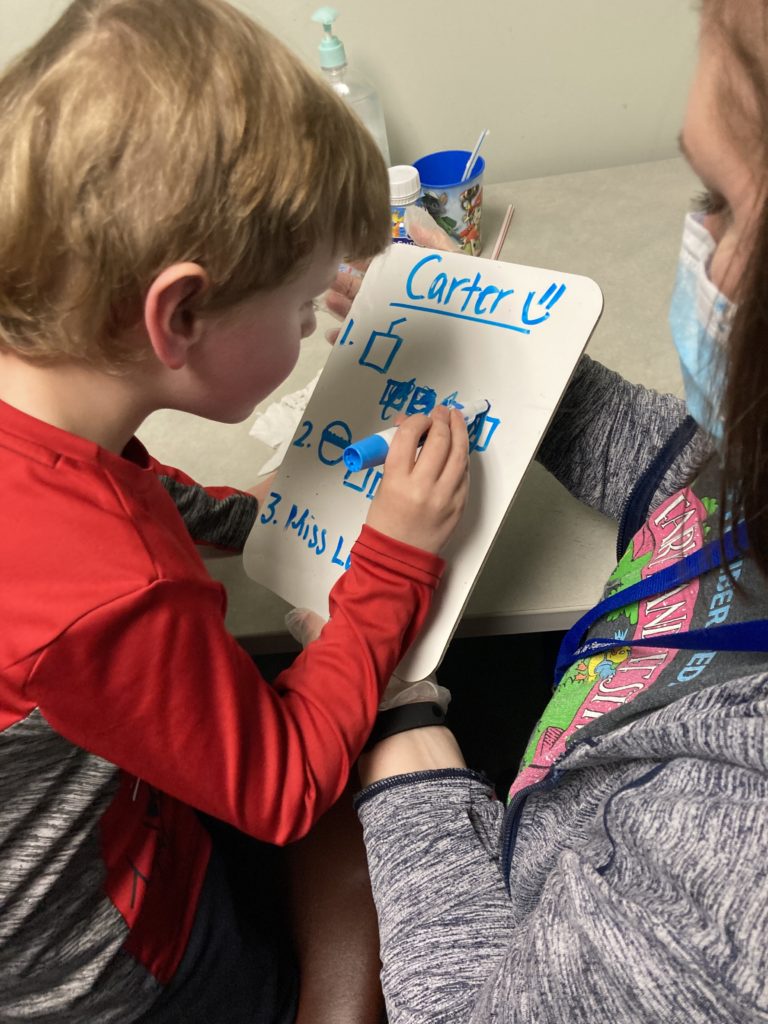
“Yogurt,” Carter repeated back, and then swirled some PediaSure around the table with his fingers.
Sarah had a dry erase board next to her with Carter’s eating goals for the session written in blue marker. When Carter accomplished one of his tasks for the session, Sarah had him fill in the box next to that task on the white board.
The work with Sarah on eating is paying off. Desiree said Carter weighed 29 pounds when he arrived at CHOP a year ago and 32 pounds when he left. Today, his weight consistently ranges between 42 and 45 pounds.
“Sarah got him to eat peanut butter and marshmallow (sandwiches),” she said. “He started eating chips. He tried an animal cracker and a pretzel. He seems to like the crunchy stuff.”
It’s a constant process, sometimes painfully slow, sometimes with setbacks.
“When he gets derailed, when he gets sick, he shuts down (and stops eating),” she said. “I’ve had to stay up all night with him to give him water, because getting dehydrated would mean we’d have to go to the ER.”
The progress is obvious, and not just with his eating.
“He’s able to walk and run and is almost back to where he was before all this started,” Desiree said. “He plays on the playground. He goes up and down steps. He’s able to express himself more now.”
Later, she talked with a lot of emotion about what she has seen bringing him to every appointment for the past nine months.
“To see his progress has been amazing. I know (coming to Schreiber) will all end at some point, but everybody has been so amazing. They are like family here, and Carter loves being here.”
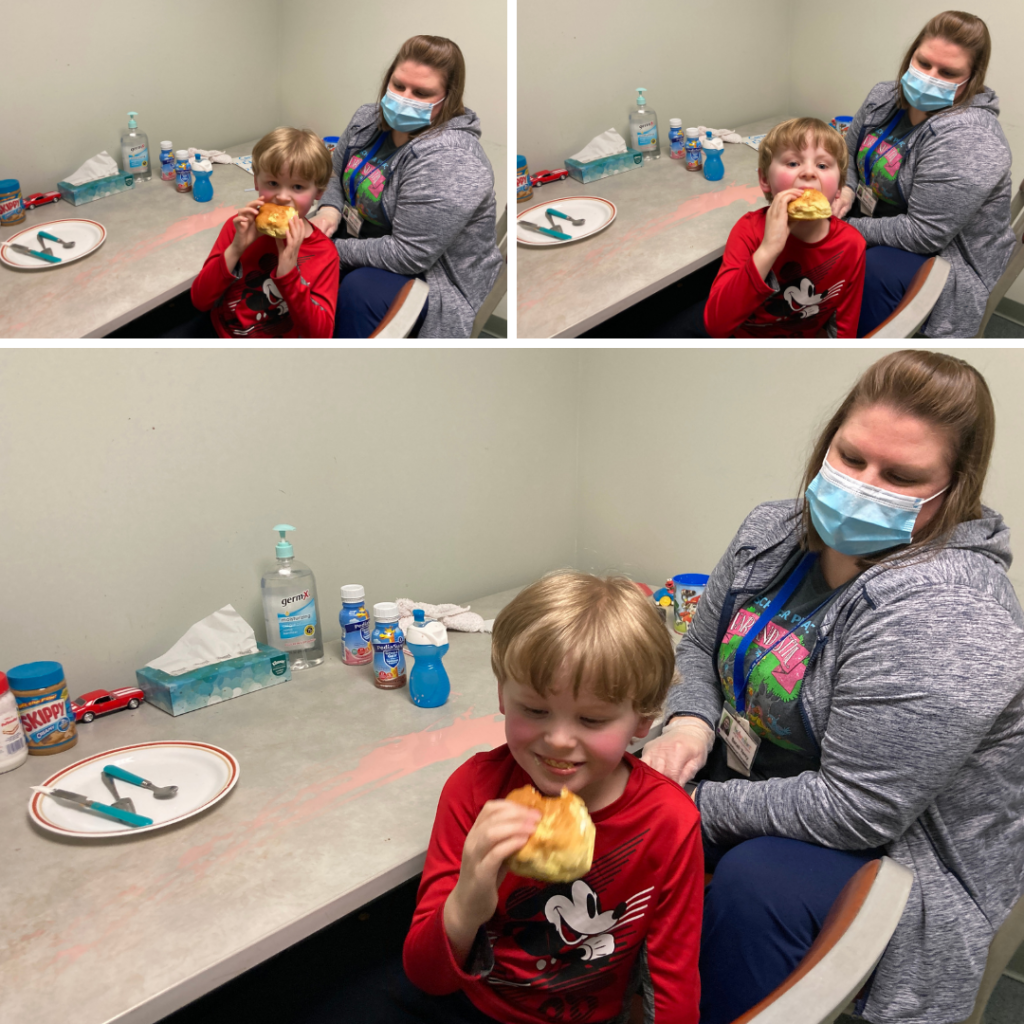
After taking two tentative tastes of a strawberry nutrition drink, Carter finishes the session with a reward: a bite of his peanut butter sandwich.
Schreiber therapy makes difference in Vietnam
October 17, 2019In May, Denisha Roberts took her second mission trip overseas with Brittany’s Hope, a Lancaster County nonprofit that serves families and orphaned children, primarily in Vietnam and Africa. During her travels on this trip, Denisha worked with a 12-year-old boy named Quan. As we do in our therapy work here at Schreiber, Denisha’s visit changed Quan’s life. We talked recently about her trip. The interview has been edited for space and clarity.
Denisha Kline, left, with Quan, one of the many children she worked with during her trip to Vietnam in May.
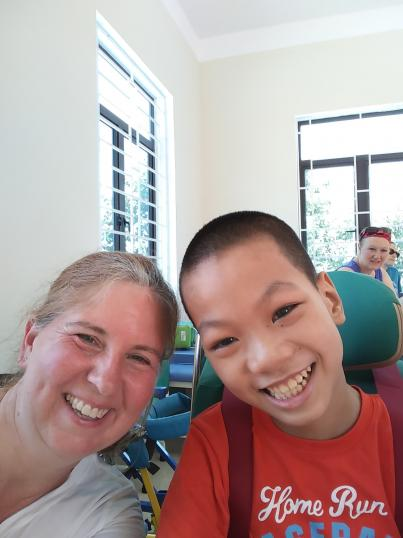
Dan Fink: We talked earlier when you were getting ready to leave on this mission trip. You’ve since gone. I just wanted to hear a little bit about how the trip went.
Denisha: The trip was amazing. We stopped at a couple different orphanages in Vietnam. We started in Ho Chi Minh City and traveled from there to two central locations in Vietnam and then to Hanoi in northern Vietnam.
At the one location, there were quite a few kids who had special needs. There was recently a capital campaign done through Brittany’s Hope to build an adaptive living quarters and get some therapy equipment for these kids. That was my favorite part of the trip because there were about six kids that had special needs, with significant motor special needs. We were able to educate the staff on how to use appropriate equipment for those kids. My favorite part of that piece of the trip was a young boy named Quan. He was about 12 years old. He was recently brought to the orphanage by his grandmother because she was no longer able to care for him. Prior to coming to the orphanage, he would spend his days when she would go to work lying on the floor in their small living area. He never had the ability to sit unless somebody was able to hold him.
I’m not sure where his parents were in this picture. His grandmother could no longer care for him and meet his needs, so she brought him to the orphanage hoping that he would receive some care there. We brought him to the adaptive living quarters, and through the help of a translator, we were able to talk to him. Sweet boy. Very quiet, soft spoken. Very serious young man. Had a lot of muscle contractures. Couldn’t sit up on his own, couldn’t really roll on his own.
Dan: Did he have a diagnosis?
Denisha: He was probably never seen medically. My pretty good best guess would be cerebral palsy. We asked him if he wanted to sit up; he said yes. He was very fearful about sitting, so we slowly brought him up into sitting on the mat table, and then we asked him if he wanted to sit in one of the adaptive wheelchairs that were donated. He said yes. So we transferred him to a wheelchair and really monitored him because he had not been sitting, just making sure that he was OK.
Dan: It can be unsettling for a kiddo who has been lying down most of his life to be in that upright position.
Denisha: Yes. Right. So once he was in the wheelchair, he had the biggest smile on his face. He was so excited to be sitting without somebody having to hold him. So I handed him a playground-sized ball and asked him if he could throw it to me. And he just looked down at his hands because his hands had never really been free to play because he had always been lying on the floor or being held. We helped him. He picked up his hands off the tray and held the ball and threw it. Then he realized he could do this. So he was playing ball a little bit with this big smile on his face. He got tired pretty quickly and went back to his room.
Later that evening, all the kids at the orphanage had a big celebration and did different skits that they had been practicing and songs and dances and games.
Dan: Just for you because you were visiting?
Denisha: Because we were visiting. We had a big buffet meal and a celebration with them. The children with special needs were not involved with this, for the most part. So I went into Quan’s room and asked if he wanted to come out and join the celebration. He said, yes, he did. We got the wheelchair, positioned him, went out. He had the best time. He was laughing, and talking with some of the other kids and the caregivers. He joined in, the kids would push his wheelchair around to the different locations. You could tell he was really enjoying himself. He got tired pretty quickly.
The caregivers took him back to his room after a few hours. I went in to check on him, and, with the help of one of the caregivers, who had a translation device on her cell phone, I was able to tell him I was really proud of him for trying new things. It can be a little scary to try new things, but his caregivers now know how to do some of the things we had done. And hopefully he will continue to work on sitting and using his hands more and doing some of the stretches we had given him to do. He smiled and said through the translator, today is the first day he was ever included in an activity. And it was the first time he was truly happy.
Quan was pretty articulate and very social and aware of what was going on around him and really craved the interaction with the other kids. And it was neat to be able to show the caregivers how it was so simple to include him in some of the activities.
Dan: Culturally and philosophically, the idea of including kids with special needs like Quan in group activities, they didn’t think about that?
Denisha: They didn’t think about it, plus they never had the means to be able to do it, unless you’re carrying some of these children.
Dan: So having a chair helps.
Denisha: Having a wheelchair makes a big difference. Otherwise, there would be no opportunity for him to be included. And for kids who are still living with families, there’s nobody who can stay home with them. There are no schools that have special equipment to accommodate the kids, or at least none that I’m aware of. It’s just much more difficult for these families. And medical care is hard for some of these families to afford.
Dan: Tell me a little bit more about some of the other things you did on the trip. You were there for how long?
Denisha: Almost three weeks. It was very hot, very humid. It was fun. We delivered some soccer equipment for some of the older children, mostly boys who enjoy playing soccer. We help the kids work in the gardens, plant coconut trees. We took two groups of children on field trips.
Dan: So these were not all special needs kids?
Denisha: No, not all special needs kids. We dedicated some houses to some families so that the mother could keep her children, because the mother didn’t have living arrangements for the children to stay. That was fun. We visited a large government-run orphanage and did some case studies with a physical therapist there and talked about some tips on working with children with autism, because they didn’t really have that bag of tricks or education to know how to help with those kids. At the large government-run orphanage, there were probably between 300-400 or more kids with pretty significant special needs. That was a little overwhelming, but you kind of just do what you can do to leave everything in a better position than when you got there.
Dan: What would you say you ended up taking away from the trip? Anything new that you learned?
Denisha: I learned a lot about the culture. It was just fun to work with the kids and give attention to some children who maybe don’t get a lot of attention because the caregivers are so busy with large groups of children. I think the best part was being able to share ideas and discuss therapy ideas with staff, and for them to be able to apply it for the children who were there. From that, we realized it was probably something we want to do frequently so I’m looking at getting some therapists to go back every year.
(laughs)
But the kids are amazing. They’re resilient. They’re willing to help each other out. They have amazing dreams. My sponsor daughter in Kenya wants to become an artist. My sponsor son wants to become either a lawyer or a police officer. These kids are going to college. And they are making these things happen.